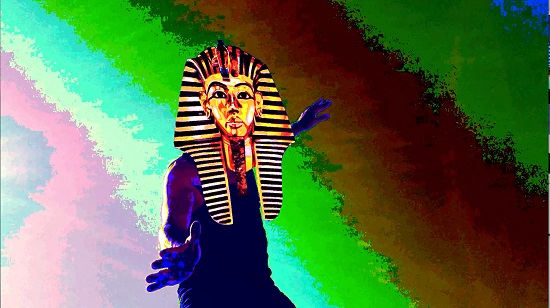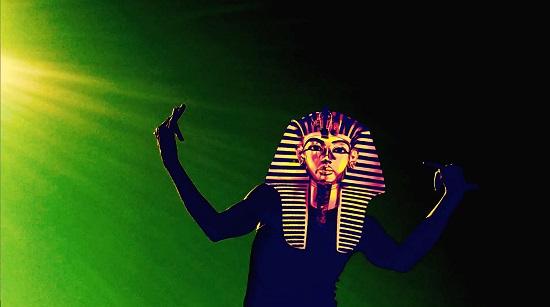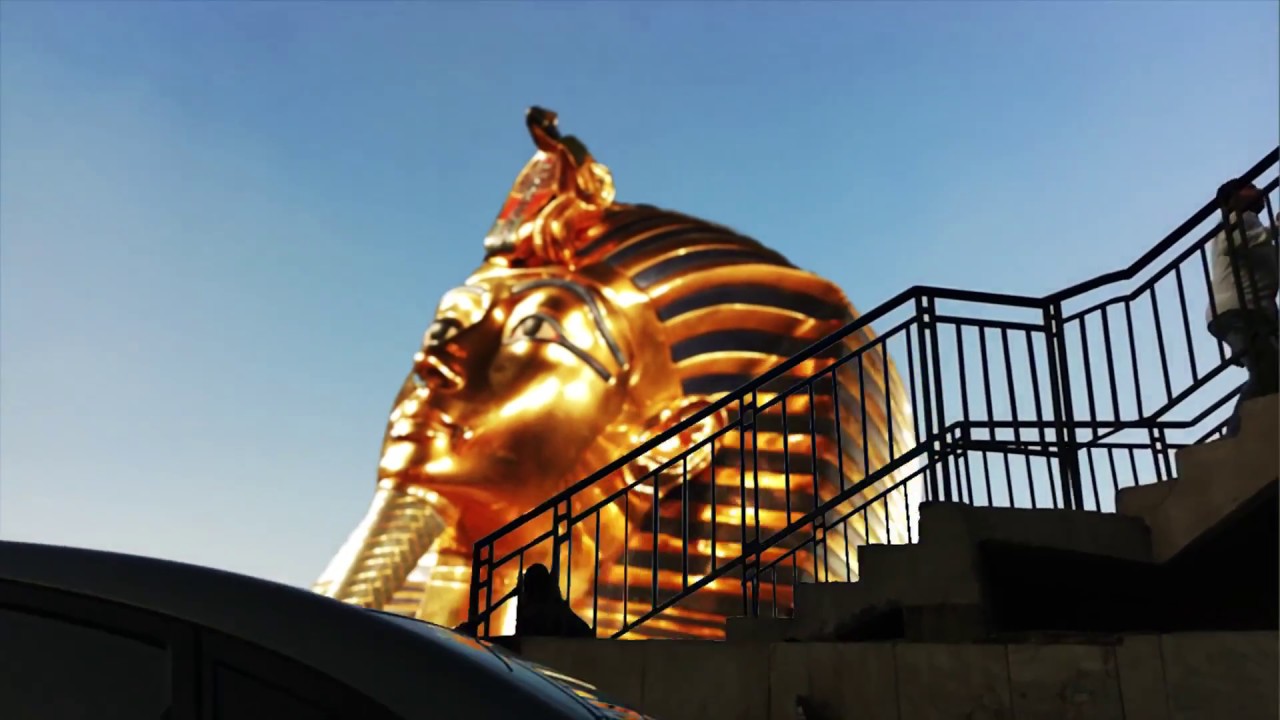Rozzma’s music sounds a bit like the whining song of a North African snake charmer, with hip hop playing through a beat-up soundsystem on the back of a wailing fire engine cutting across Cairo. His videos are a DIY mash-up of bubblegum graphics of Tutankhamun, Arabic script and Egyptian street scenes. And he’s 7000 years old.
He is a fictional character, who only exists in outer space — or you can look him up on YouTube and find him at the odd European festival date. (He materialised recently at Sonar in Barcelona back in June, and will be time travelling to Unsound in Poland this October).
The last time Rozzma lived on Earth, Egypt was the most advanced civilisation on the face of the planet. After being lost in time and space for centuries, Rozzma is finding it pretty weird that King Tutankhamun’s mask, once the greatest work of art and engineering, is now on the side of Egyptian pound coins, which are worth 40% less than they used to be.
After hearing last year’s ‘Donya Fakka’ EP on Acid Arab, tQ connected with Rozzma on FaceTime to find out why the real artist behind Rozzma wants to stay anonymous, which myths he’d like to correct about modern Egypt, why he thinks electro-shaabi is the most exciting thing to have happened to Egypt in years and the weird sounds you can get out of an Ikea laptop stand…
So who is Rozzma, was he a Pharoah?
The fictional character of Rozzma began existing and making music in 2016. The story goes that he lived 7000 years ago and has been travelling in outer space. He existed at the time of the Pharoahs, and is back on Earth, experiencing how different things are now. It’s not a story of a Pharoah god. He’s a random dude. He was a working class kid who was around and has travelled. He’s just a guy. But people are fascinated with that time, specifically the time of Tutankhamun.
The mix of science fiction and time travel, and Ancient Egyptian symbolism, it reminds me a bit of Sun Ra and their Afro-Futurist aesthetic, was that something that inspired you?
It’s very flattering. But no, it’s not like Sun Ra. It wasn’t at all an influence. It’s an alternative story – I don’t want to link it to any existing myths or stories.
During the 1970s, and all the black rights abuses, things were so corrupt that people had to imagine these other worlds, these utopias. That escapism was essential. Nowadays, there’s so much crap, I also wanted to create a utopia. It’s not just Egypt. It’s the world in general that’s messed up. I don’t feel bad being in Egypt – I feel bad being in the world, almost! I don’t mean to sound pessimistic – but as a young individual, it’s not easy. It’s not perfect anywhere. This is my way of escaping that.
Visually, the imagery and the symbolism of Ancient Egypt is amazing if you’re going to create an imaginary world.
Yeah and technologically they were so advanced. In architecture, wind power, agriculture, everything. There’s a whole floor dedicated to the Ancient Egyptian period in the Louvre – household items, cutlery, plates, Mummies, furniture . . .
Also musically they were super advanced. They invented a lot of percussive, wind instruments, harp, tabla . . . Sometimes people ask me why I make music with Western instruments, but so many Western instruments came from Africa originally. And so much pop music can be traced back to African sounds, just look at breakbeats, or drum and bass, the way it’s structured, that comes from African rhythms. Ninety percent of mainstream pop uses the pentatonic scale, which came from Africa.
On your track ‘Sheyaka’ it sounds a bit like you’re playing the North African instrument – is it the mizmar – with the whining clarinet sound?
Yeah, the mizmar. But actually no. The sound on ‘Sheyeka’, that’s not an instrument – that’s just my voice. It’s just a very short loop. I’d finish a track, then take the vocal line and record it without effects, and manipulate it. I know how Autotune works and I knew where to stretch the sound. I thought it was an interesting sound. When I’m producing, I play real instruments, and percussion, but on a plastic Ikea thing, not a tabla. It’s a little Ikea laptop stand – I noticed one day, when you play it with your fingers, it sounds good.
I don’t try to connect myself with any specific instrument – I try to think like an alien that’s just arrived here. I take a different approach, to support the Rozzma story. The twist is that he’s from the future, not the past. He has travelled faster than the speed of light, and returned faster than the speed of light (this is fiction, I can say stuff like this) so he’s actually from the future. To me, putting Rozzma in a domain where they are using instruments that were invented 7000 years ago, he would use technology from the future.
I mainly use synthesisers and samples. It’s not a fanatic thing – I’m just always looking to create new sounds that didn’t already exist. I pay real attention to detail, especially for the kicks. Most of the kicks are made from a very basic synthesiser or sounds made with a field recorder. Like a plastic bottle, most of the time. With water inside, it creates crazy sounds and bass, if you listen with a microphone, the air waves, and the pressure, the physics do something really fascinating. It’s a bit futuristic – we have been depending on computers but if you go back to the fundamentals of sound, you’re forcing the experiment. You’re no longer using a preset – not that I’m against that, but you’ve heard that sound 60 million times already on tracks. It definitely makes it more interesting for me and it feels unique.
How does the live show vary from the music you produce at home?
I do a live audio visual experience – it’s very loud music. It’s a weird experience, I could never listen to it at home!
I like to call it an experience – the original plan for the EP was for conceptual videos or episodes if you wanna call them that. But it was kind of expensive! What I do is all DIY, production, mixing . . . It’s 90% self funded. It’s not just about being a control freak. I have to let go of things sometimes. We’re a team – the artist and the main label Crammed Disks, of which the sub label is Acid Arab.
What I’m doing is not label friendly for any label! I’m not so big on releases in general. Yeah, physical releases are cool to have. But to print a piece of plastic – computers don’t come with CD players anymore. We should be putting all the money in to the live show I think. And make it really special. There’s a compromise to be made obviously – that’s been the label’s business for 30 years. But for me ideally, it would be a live show with an A/V aspect – the Rozzma character, the visuals, the videos – it’s a complete package.
I’m working on an updated version of the live show for Unsound. I don’t know what venue I’ll be playing in yet. I’m very, very excited about that. That all came about when I had the EP almost finished and I started sending demos to people who might like it. Including Acid Arab – Guido [Minisky] and Hervé [Carvalho].
I liked their stuff and I had already been organising mini tours in Switzerland – I organise the bio, the press shots, everything. We managed to get three gigs, through people we know. We tested out the show to see how it sounded. Herve from Acid Arab came to the event, he said he wanted to sign the project to their new sub label, Acid Arab. I guess things moved from there.

Do you play much in Egypt?
I’ve only played one show in Egypt. People know about me on social media and stuff. Egypt is very tricky. There is an amazing amount of youth, and promoters and stuff. But the venues are looking for money. You’ll rarely find a venue where the promoter is concerned with pushing the sound. It’s closer to the food and beverage industry really! That leaves it up to the crowd basically. When you look at the crowd, let’s just say, I don’t want to get into politics, but it’s not an even distribution of wealth. You have a very small segment, maybe 2% of the population who can afford to party and pay 8 euro a beer for a night of deep house, techno, big lights, drinking, that kind of thing. On the other side you have some alternative rock bands with a huge following, but to be very honest the music is – I’ve learned to find political correct terms to label this kind of stuff [laughs] – it’s very basic.
Then you have the mass, the majority of people, the stuff that people listen to and really go crazy for is, what the Western world call electro-shaabi – this is the closest thing to the hip hop or trap scene. Mharaganat. That scene is huge, and picking up now, and it’s still widely criticised by the elite, or people who are scared by it – they don’t consider it ‘culture’. They don’t understand why kids are growing up dancing and singing to this music about having a good time! They should be happy it’s peaceful! Nobody is killing anybody. In that scene, it’s mainly like kids throwing their own parties in the ghetto areas, blasting big soundsystems with fireworks and stuff.
It’s honestly one of the best things to have happened to Egypt in a long time. It was existent before and after the Arab Spring. I’d like to completely separate the Arab Spring completely from the arts – in general I hate to link them. That period, all of a sudden the Western World was interested in Egypt. 2010/ 2011, the time of the uprising, Egypt was in the spotlight, but artists had always been doing this, long before.
Because of the internet, you don’t really know what’s real anymore. As much as we try to disconnect ourselves from social media, that is unfortunately the only outlet we have today for finding out what’s going on. But it’s 90% rubbish. I feel it when I go abroad – people ask me, “So, what’s it like living in Egypt right now? What’s happening in Sinai? It seems so dangerous!”
It’s 10,000 times safer than living in the US or UK. I mean statistically, you’re much more likely to be a victim of handgun crime in the States, than anyone has been in Egypt in lie the last 50 years. Noone owns a handgun in Egypt. You can’t just own a handgun.
What do you think about the new wave of Egyptian musicians that are becoming popular in Europe just now, people like Islam Chipsy, or Nadah El Shazly, Maurice Louca and Maryam Saleh?
I think it’s interesting that foreign media is starting to discover more sounds from Egypt. I think it’s also really cool that these specific artists are not identical and that kind of demonstrates a variety of sound emerging from this scene. I would not necessarily call it new wave because these guys have been active from more than 6 years now, but then again that’s a relative thing.
Why do you continue to remain anonymous?
Undercover is easier! I mean, noone ever remembers the name of the guy who wrote Batman!
Rozzma’s debut EP ‘Donya Fakka’ was released last November on Acid Arab Records in cooperation with Crammed Discs.
Rozzma plays live at Unsound Festival in Krakow, Poland, October 12th



